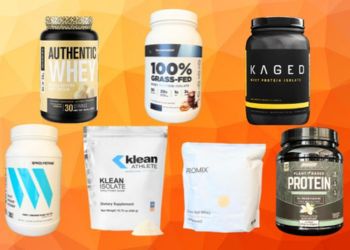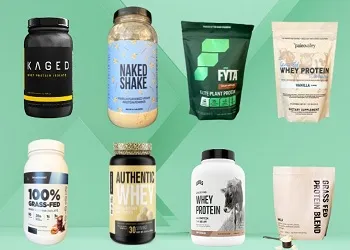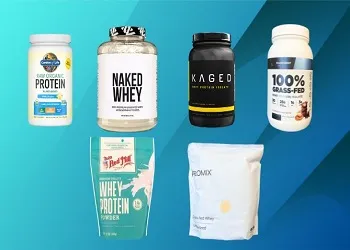Pre-workout supplements are renowned for their capacity to enhance athletic performance, increase energy levels, and optimize focus during exercise routines, making them a popular choice amongst fitness enthusiasts and athletes.
While the advantages are substantial and the allure of improved workouts is significant, it is crucial to acknowledge and understand the potential side effects that accompany the consumption of these supplements.
There are so many different pre-workout supplements to choose from, and many of them have varying ingredients that will affect side effects.
By knowing the risks and side effects of pre-workout, you can determine if a pre-workout supplement is right for you or if an alternative like coffee before a workout would be a better choice.
According to a study titled “Common Habits, Adverse Events, and Opinions Regarding Pre-Workout Supplement Use Among Regular Consumers”, over half of the 1045 participants experienced adverse effects when taking multi-ingredient pre-workout supplements (MIPS). The most common ones were skin reactions (flushing and tingling sensation), heart abnormalities, and nausea. Other side effects have been reported such as jitters, insomnia, nausea, headache, digestive issues, sweating, and water retention.
Other important study findings included:
- Females were more likely to experience side effects.
- It’s important that users do not take additional supplements with caffeine and niacin; these are two ingredients that are likely to reach a tolerable upper limit (UL).
- 89% of participants indicated their primary reason for using MIPS was for increased energy and focus.
Table of Contents
Common Side Effects
Again, this varies by brand but most pre-workout supplements contain a similar array of ingredients including caffeine, niacin, beta-alanine, citrulline malate, arginine, sodium bicarbonate, and creatine.
1. Stimulant Effects

Stimulants heighten central nervous system (CNS) activity. This is why caffeine, the most popular stimulant, enhances focus and delays fatigue. On the other side of the coin is that when consumed in excess, caffeine can cause minor unpleasant side effects like a fast heart rate, high blood pressure, jitteriness, insomnia, nausea, and headache. Many of us have probably overdone it on caffeine a few times. These negative effects aren’t typically dangerous in healthy people, but they can definitely hamper a quality gym session.
The Food and Drug Administration (FDA) recommends consuming no more than 400 milligrams of caffeine per day. Many pre-workouts have about 200 mg, so half of the recommended limit. This recommendation is similar to that of the ISSN, which states caffeine can enhance exercise performance in doses of 3-6 mg/kg of body weight. Anything over that offers no additional benefit and may lead to side effects.
Insomnia is the inability to fall asleep, stay asleep, or get good quality sleep. Stimulants like caffeine can cause insomnia if consumed late in the day. Sleep experts recommend consuming caffeine no later than eight hours before bedtime. This is something to bear in mind if you are someone who prefers working out in the evening.
It can be relatively easy to overdo it with caffeine, so if you want to avoid the overstimulation from too much caffeine, be mindful of how much pre-workout you are taking. There are also several amazing stim-free pre-workouts on the market that are effective at improving performance but without the jitters.
2. Digestive Issues
Sodium bicarbonate, or baking soda, is used in some pre-workout supplements as an ergogenic aid. A 2021 review of the evidence indicated that the most common side effects of supplementation were bloating, nausea, vomiting, and abdominal pain, though the severity was low. Other potential culprits for stomach upset are caffeine and magnesium, which is in some pre-workout formulas.
For sodium bicarbonate, the ISSN recommends doses of 0.2-0.3 g/kg of body weight to keep side effects at bay. Additionally, sometimes having caffeine or other supplements on an empty stomach can cause nausea or discomfort. Try having a banana or piece of toast alongside your pre-workout to help combat this side effect.
3. Skin Flushing
Consuming niacin (Vitamin B3) in supplements is sometimes accompanied by a “niacin flush,” meaning someone can appear a bit red in the face, chest, or arms. Though it can be uncomfortable, flushing is harmless and should subside within an hour.
The recommended dietary allowance (RDA) for niacin is 16 mg/day for men and 14 mg/day for women. The tolerable upper limit (UL) for niacin is 35 mg per day, which is associated with flushing. Most people get enough B3 through diet, and the extra in pre-workout isn’t necessary. If you have experienced skin flushing, maybe choose a supplement without niacin.
4. Headaches

Ingredients like beta-alanine, citrulline malate, and arginine are nitric oxide boosters that increase blood flow by expanding blood vessels, which has been tied to improved exercise performance. Vasodilation (expansion of blood vessels) may cause headaches in some people.
Citrulline, or sometimes citrulline malate on labels, enhances blood flow so it can contribute to headaches when consumed in excess. L-citrulline is a non-essential amino acid that is supposed to increase nitric oxide production. Citrulline malate is slightly superior to L-citrulline due to its greater ability for absorption.
Nootropics are occasionally added to specialty pre-workout powders or capsules. For example, Alpha-GPC is a cognitive enhancer sometimes added to pre-workouts to increase focus and energy. These can also come with headaches in some people.
To reduce the likelihood of headaches, don’t take more than the recommended amount. Make sure to stay hydrated to avoid any dehydration. Maybe look for stim-free pre-workouts to help avoid headaches as well.
5. Sweating
Thermogenics, by definition, are substances that produce heat. When ingested in a food or supplement, they may cause someone to sweat more. Ever had a really spicy meal and felt the sweat start accumulating on your brow? That’s the thermogenic effect. Caffeine is considered a stimulant with thermogenic properties, but not all thermogenics are stimulants and vice versa. Sometimes pre-workout will contain thermogenic ingredients other than caffeine like black pepper extract.
6. Water Retention/Bloating
Because creatine draws water into the muscles, it has been known to cause weight gain in some people. But again, this is primarily due to water weight, and it means that the supplement is working. This is more common during a creatine loading phase as opposed to taking a lower daily dose. Creatine is commonly used in pre-workout formulas due to its propensity to help exercise performance and recovery.
Creatine is safe and effective when taken in 3-5 gram daily doses. A creatine loading phase of 0.3 g/kg of body weight daily for 5-7 days is an option for those that want to see results faster, but is not necessary.
7. Tingling Sensation (Paresthesia)
This is a pretty notable side effect of many popular pre-workouts that some people don’t mind and others could do without. The feeling of tingling or numbness in the extremities is due to beta-alanine content in many pre-workout supplements. Paresthesia isn’t harmful, it’s just startling for some.
The recommended dosage for beta-alanine is 4-6 grams. However, side effects like paresthesia can be attenuated by splitting this amount into smaller doses of 1.6 grams each.
How to Choose the Best Pre-workout Without Side Effects?
If you want to use pre-workout supplements while still preventing side effects, there are measures you can take as ways to reduce side effects.
- Reduce the dosage. The easiest way to prevent and reduce side effects is to first take the proper dosage and don’t go over it. Then, if you are still experiencing unwanted effects, consider reducing the dose by taking smaller doses at different intervals or just taking less altogether.
- Drink plenty of water. Some ingredients in pre-workout can instigate dehydration, which is often accompanied with a headache. You should be remaining adequately hydrated for optimal fitness anyways; it’s just something to remain even more mindful of when taking pre-workout.
- Make sure the mix isn’t too concentrated. This coincides with the above points in that a super concentrated beverage can be too strong too fast and increase the likelihood of feeling dehydrated.
- Look for L-theanine. In supplements with caffeine, L-theanine can help mellow out the common unwanted side effects associated with caffeine like jitteriness and anxiety.
- Check for certifications such as ConsumerLab, U.S. Pharmacopeia (USP), and NSF International.
- Avoid proprietary blends. Not that all blends are bad, but this is an easy way for companies to mask ingredients that may have unintended side effects. It’s best to know exactly what is in your supplement, especially if you’re taking it consistently.
- Maybe cycle on and off to avoid building up a high tolerance for caffeine.
- There are plenty of non-stim options on the market. These would be good to try for anyone who is sensitive to caffeine or experiences side effects like insomnia, increased heart rate, jitteriness, or anxiety from taking pre-workout.
- Don’t dry scoop pre-workout—just don’t do it.
If all else fails, keep trying different brands and formulas to determine what works best for you. For those with pre-existing conditions, it’s best to clear any supplement regimen with a health professional first. Talk to your doctor especially if you have heart problems or experience heart palpitations before taking pre-workout.
Alternatives to Pre-Workout
If you like using pre-workout supplements but don’t appreciate the side effects, traditional foods and beverages offer a more natural, and often cheaper, alternative that provides your body with the fuel it needs to have effective workouts.
Make sure to stay hydrated before, during, and after your workout. Your body needs fluids to function, and we lose fluids through sweat—this is why hydration is key for athletic performance.
Have black coffee or green tea for a caffeinated pre-workout beverage. If you’re after the mental edge from pre-workout, caffeine from coffee can serve the same purpose. Just make sure to watch out for coffee or tea drinks that contain sugar or dairy products. These may not be ideal before a workout.
Have a snack with protein or carbs before your workout and refuel within two hours of exercise. Ideally, this includes a meal that contains protein.
What Are the Benefits of Pre-Workout?

The main benefits of pre-workout are improved endurance, greater strength, and intense focus. Pre-workout supplements are designed to improve athletic performance and provide the user with the energy and stamina needed during workouts. This has been proven in both high intensity interval training (HITT) and cross country athletes. Hypothetically, when someone has the capacity to workout longer and harder, improved results in muscular strength and growth follow.
So, Should You Use Pre Workouts?
This comes down to personal choice. If you are wishing to take it up a notch in the gym by increasing focus and stamina and reducing fatigue, good pre-workout formulas may help you achieve this. Although pre-workouts have a place in some people’s supplement arsenal, there are other ways to fuel and focus before a workout if you are concerned about side effects.
If you are sensitive to caffeine or have a heart condition or high blood pressure, it is wise to skip supplements with stimulants. At least speak to your doctor before taking pre-workout supplements, if you are considering it.
Do pre-workouts have side effects?
Yes, the ingredients in pre-workout can lead to some undesirable side effects. However, this will vary greatly by product. There are a few common ingredients like caffeine, beta-alanine, citrulline malate, and creatine that go into most brands’ formulas, but even then, the amounts can vary.
What are the side effects of pre-workout?
Potential side effects of multi-ingredient, pre-workout supplements are jitters, increased heart rate and blood pressure, sweating, insomnia, headache, digestive issues, tingling or numbness in the extremities, and water retention.
Is it safe to take pre-workout every day?
While it is technically safe to take pre-workout in the recommended dosage every day, it isn’t necessary in order to see results. Furthermore, if taken daily, users may develop a tolerance to some of the ingredients and not continually reap the same benefits.
References
Bagdy, G., Riba, P., Kecskeméti, V., Chase, D., & Juhász, G. (2010). Headache-type adverse effects of NO donors: vasodilation and beyond. British Journal of Pharmacology, 160(1), 20–35. https://doi.org/10.1111/j.1476-5381.2010.00643.x
Commissioner, O. of the. (2021). Spilling the Beans: How Much Caffeine is Too Much? FDA. https://www.fda.gov/consumers/consumer-updates/spilling-beans-how-much-caffeine-too-much#:~:text=4.
Farzam, K., Faizy, R. M., & Saadabadi, A. (2020). Stimulants. PubMed; StatPearls Publishing. https://www.ncbi.nlm.nih.gov/books/NBK539896/
Figueiredo, C., Lira, F. S., Rossi, F. E., Billaut, F., Loschi, R., & Padilha, C. S. (2020). Multi-ingredient pre-workout supplementation changes energy system contribution and improves performance during high-intensity intermittent exercise in physically active individuals: a double-blind and placebo controlled study. Journal of the International Society of Sports Nutrition, 17(1). https://doi.org/10.1186/s12970-020-00357-6
Fye, H., Pass, C., Dickman, K., Bredahl, E., Eckerson, J., & Siedlik, J. (2021). The Effect of a Multi-Ingredient Pre-Workout Supplement on Time to Fatigue in NCAA Division I Cross-Country Athletes. Nutrients, 13(6), 1823. https://doi.org/10.3390/nu13061823
Grgic, J., Pedisic, Z., Saunders, B., Artioli, G. G., Schoenfeld, B. J., McKenna, M. J., Bishop, D. J., Kreider, R. B., Stout, J. R., Kalman, D. S., Arent, S. M., VanDusseldorp, T. A., Lopez, H. L., Ziegenfuss, T. N., Burke, L. M., Antonio, J., & Campbell, B. I. (2021). International Society of Sports Nutrition position stand: sodium bicarbonate and exercise performance. Journal of the International Society of Sports Nutrition, 18(1). https://doi.org/10.1186/s12970-021-00458-w
Guest, N. S., VanDusseldorp, T. A., Nelson, M. T., Grgic, J., Schoenfeld, B. J., Jenkins, N. D. M., Arent, S. M., Antonio, J., Stout, J. R., Trexler, E. T., Smith-Ryan, A. E., Goldstein, E. R., Kalman, D. S., & Campbell, B. I. (2021). International society of sports nutrition position stand: caffeine and exercise performance. Journal of the International Society of Sports Nutrition, 18(1). https://doi.org/10.1186/s12970-020-00383-4
Institute of Medicine (US) Standing Committee on the Scientific Evaluation of Dietary Reference Intakes and its Panel on Folate, Other B Vitamins, and Choline. (2019). Niacin. Nih.gov; National Academies Press (US). https://www.ncbi.nlm.nih.gov/books/NBK114304/
Jagim, A. R., Camic, C. L., & Harty, P. S. (2019). Common Habits, Adverse Events, and Opinions Regarding Pre-Workout Supplement Use Among Regular Consumers. Nutrients, 11(4), 855. https://doi.org/10.3390/nu11040855
Kreider, R. B., Kalman, D. S., Antonio, J., Ziegenfuss, T. N., Wildman, R., Collins, R., Candow, D. G., Kleiner, S. M., Almada, A. L., & Lopez, H. L. (2017). International Society of Sports Nutrition position stand: safety and efficacy of creatine supplementation in exercise, sport, and medicine. Journal of the International Society of Sports Nutrition, 14(1). https://doi.org/10.1186/s12970-017-0173-z
Pacheco, D. (2021, January 22). Caffeine & Sleep Problems. Sleep Foundation. https://www.sleepfoundation.org/nutrition/caffeine-and-sleep
Trexler, E. T., Smith-Ryan, A. E., Stout, J. R., Hoffman, J. R., Wilborn, C. D., Sale, C., Kreider, R. B., Jäger, R., Earnest, C. P., Bannock, L., Campbell, B., Kalman, D., Ziegenfuss, T. N., & Antonio, J. (2015). International society of sports nutrition position stand: Beta-Alanine. Journal of the International Society of Sports Nutrition, 12(1). https://doi.org/10.1186/s12970-015-0090-y














